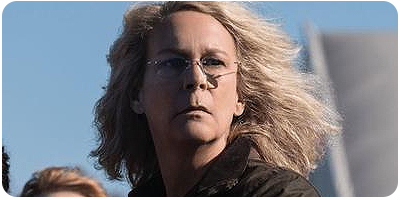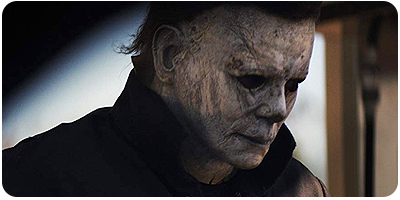
Over ten previous installments, the "
Halloween" series has had a long, sordid history, of varying degrees of quality and full of twisted and increasingly convoluted alternate timelines. When Laurie Strode (Jamie Lee Curtis) presumably killed her brother, psychopath Michael Myers, in 1998's "
Halloween: H20," only for him to turn the tables and unceremoniously take her life in the opening act of 2002's rock-bottom entry "
Halloween: Resurrection," it was a cheap, unnecessary slap to the face. As one of the all-time great horror heroines, Laurie Strode—and Jamie Lee Curtis (2010's "
You Again")—deserved better. For this 40th-anniversary occasion, her moment of much-deserved redemption has arrived.

A direct, to-the-bone sequel to John Carpenter's seminal
1978 original, 2018's "Halloween" gets to the crucial heart of what made that picture a genre classic and its purely evil villain so unspeakably chilling. Gone is the sibling connection between Laurie and Michael (a revelation originally devised in 1981's "
Halloween II"), and long, long gone is the silly pagan Thorn storyline introduced in 1989's "
Halloween 5" and explored to wearying effect in 1995's atmospheric but messy "
Halloween: The Curse of Michael Myers." Writer-director David Gordon Green (2015's "
Our Brand Is Crisis") and co-writers Danny McBride (2011's "
Your Highness") and Jeff Fradley keenly display a love for the film that started it all, but also put their own surprising yet wholly copacetic spin on the material.

It has been forty years since Laurie, then a 17-year-old babysitter, narrowly lived through an attack by escaped homicidal mental patient Michael Myers on Halloween night. Though Michael was quickly apprehended and has been locked up at Smith's Grove Rehabilitation Facility ever since, Laurie has never fully been able to move on. The deep-cutting tremors from that terrifying ordeal have run her life (she lives on a secluded compound on the outskirts of hometown Haddonfield, Illinois) and affected her family, none more so than grown daughter Karen (Judy Greer), taken away from Laurie when she was twelve. When a routine bus transfer to a different facility ends in a crash, Michael once again escapes. It's a day the frightened yet resolved Laurie has waited and trained herself for over the last four decades, and wouldn't you know: it's the 31st of October. As Haddonfield's residents unwittingly line themselves up for a slaughter, Laurie sets out to warn Karen and teen granddaughter Allyson (Andi Matichak) while preparing to confront—and hopefully put an end—to her biggest living fear.

"Halloween" is a triumph in form, simple but not simplistic. It delivers as a brutal, intense funhouse thrill ride, yes, but it is every bit as boldly resounding as a slice-of-life delving into the reverberations of PTSD on survivors and their loved ones. Returning to the iconic role which kickstarted her acting career, Jamie Lee Curtis presents an aching, unvarnished portrayal of Laurie Strode, now well into middle age and still struggling to work her way through the emotional paralysis left in the wake of seeing her friends killed and her own life nearly cut short all those years ago. Sitting in her car, watching Michael from afar as he boards the transfer vehicle, she is confronted by the entirety of her troubled past and the enormity of how a single harrowing night has informed every day since. It's a striking moment in a film of many, and Curtis plays it with tortured authenticity.

The narrative is stripped down just enough that the picture's filmmaking artistry shines through, never beholden to what was done before but offering fond homages and unforced, exquisitely subtle references to the franchise's past along the way. Cinematographer Michael Simmonds' (2016's "
Nerve") lensing is exquisite, an ode to the ambitious, classy, textured camerawork of Dean Cundey (who shot "
Halloween," "
Halloween II," and 1982's "
Halloween III: Season of the Witch"). An extended set-piece following the masked Michael on his reign of terror through the vulnerable, unlocked homes and trick-or-treater-filled streets of Haddonfield demonstrates nothing less than the unbarred, quixotic magic of cinema. The score credited to original composer John Carpenter, Cody Carpenter, and Daniel A. Davies doesn't merely repeat itself—one brand-new musical composition as a screaming Allyson runs through the lonesome late-night streets is a rapturously portentous thing of beauty—but when they do incorporate the beloved tried-and-true themes, they are like old, haunting, melodic friends.

It is a credit to the unsuspectingly nuanced screenplay that nearly every character, no matter how minor, is written with personality and welcome specificity, right down to a father (Brien Gregorie) and dance-loving son (Vince Mattis) whose hunting trip is cut short when they come upon the wreckage—and suddenly set-free patients—of the bus accident. A pair of podcasting investigative journalists, Dana Haines (Rhian Rees) and Aaron Korey (Jefferson Hall), also make lasting impressions, while Haluk Bilginer (2009's "
The International") is quirky and endearing as Dr. Sartain, a successor to Michael's late psychologist Dr. Samuel Loomis.

A "Halloween" film wouldn't be quite the same without some potential teenage victims, and this film delivers in the same way the first did: by presenting Allyson and her pals as everyday kids, going about their daily lives, unaware of the horrors lurking in the shadows. Virginia Gardner (2016's "
Goat"), as Allyson's best friend Vicky, is especially charismatic, her warm and funny exchanges with unfiltered babysitting charge Julian (Jibrail Nantambu, terrific) a highlight. There is also a creepy, deviously ingenious scene reserved for Oscar (Drew Scheid), Michael's stalking of him punctuated by Mr. Elrod's backyard motion-sensor light.

Newcomer Andi Matichak is wonderfully cast as Allyson, her empathetic relationship with grandmother Laurie a touching counterpoint to the more frayed one Laurie has with daughter Karen. As Karen, a woman who has fought her whole adult life against her mom's teachings that the world is a dangerous place, Judy Greer (2018's "
Ant-Man and the Wasp") at long last gets a chance to step away from the supporting best-friend, ex-wife, and sister roles she usually receives. In a handful of potent, economic scenes, Greer and Curtis are able to build a lived-in history between them, one of undoubted love but also, in Karen's case, resentment. The way these three generations of women ultimately band together against their aggressor is inspiring and deeply satisfying, the urgent and timely lifeblood of the entire picture.

No "Halloween" sequel could ever quite match the first one, an independent feature that scared audiences as the '70s were winding down, broke box-office records for the time, and inarguably played a part in the creation of the slasher subgenre while kicking off a wave of early-'80s imitators. This new "Halloween," however, innately understands more than any other film in the series the key ingredients that have bewitched viewers so much in the forty years since. By stripping away the bloodline between Michael Myers and Laurie Strode, director David Gordon Green makes Myers scary again, undiscerning in who he kills, the threatening embodiment of true evil in human form. His mask, worn and somewhat decayed over time, the eyeholes a window into black nothingness, has never looked better or more disquieting. And, by seeing him aged just as much as Laurie, he has become at once more fallible and more frightening, his broiling rage and his lust for murder exploding before one's eyes.

"Halloween" is a reverent, rousing, moody, marvelously suspenseful success, a new perennial holiday-horror mainstay. For this diehard fan, there are very minor nitpicks to be had—the opening credits, another affectionate ode to the original, would have worked better had they kicked the film off rather than been placed awkwardly after a prologue; a few more scenes catching up with Laurie at the onset would have been welcome in piercing beneath the surface of her everyday life—but this is inevitable, more a comment on my own passion and profound history with the series than the film itself. Its final indelible image, saying so much about how the emotional wounds of trauma live on, gets more brilliant the longer one considers it. At this critical moment in history when the voices of assault survivors are being heard by allies and yet so often still discounted by those in power, "Halloween" is the "Halloween" the world needs in 2018. By refusing to play the victim any longer, Laurie takes back her future—and the strength she's always had inside her.